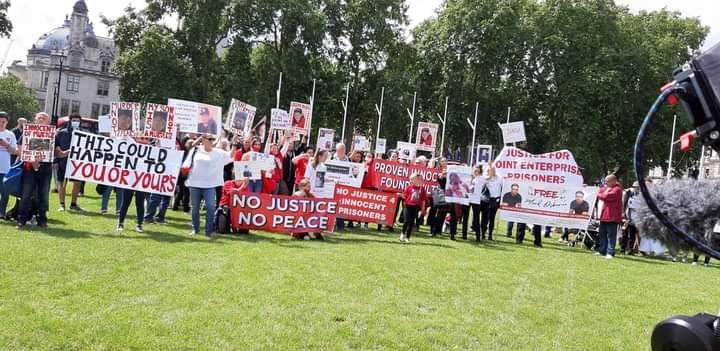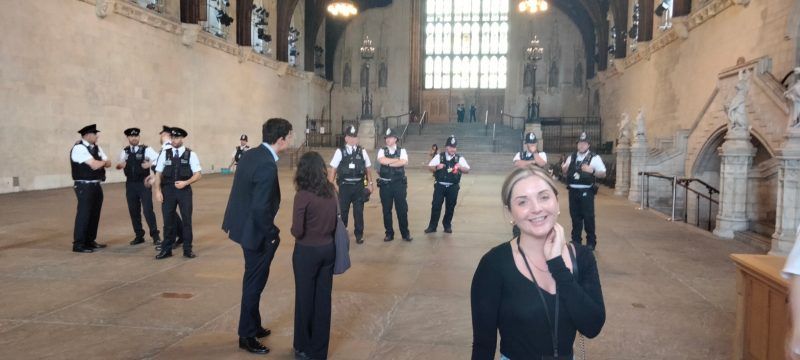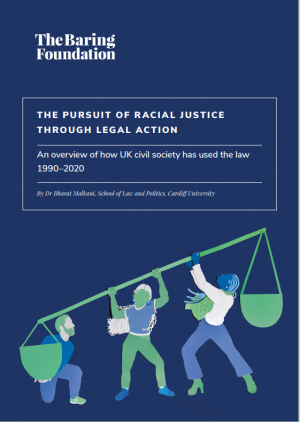JENGbA is a grassroots campaign, run by volunteers. Many are the mothers, sisters, aunties and cousins, but also heartbroken dads and uncles, who could not stand by while their loved ones are experiencing the injustice of mandatory life sentences for crimes committed by others, i.e. for Joint Enterprise.
Joint Enterprise convictions mostly affect young Black men. JENGbA received a grant from the Baring Foundation to address the racial disparity in joint enterprise cases through legal action.
They are pursuing change on a range of fronts – including in parliament through a Private Members’ Bill and exploring the possibility of a judicial review. Here’s an update on the journey so far by Gloria Morrison, JENGbA’s campaign coordinator.
“Our campaign is now supporting 1,500 prisoners serving life sentences convicted as secondary parties mainly on homicide charges. Our data, and plenty of academic data and street knowledge, proves that the Joint Enterprise doctrine targets working class BAME communities but particularly young Black males.
In 2021, the All-Party Parliamentary Group on Miscarriages of Justice agreed in their report that Joint Enterprise was leading to miscarriages of justice and clearly over criminalising secondary parties mainly of Black and Minority Ethnic and working-class communities. They also confirmed that the “substantial injustice test” for those convicted using the doctrine of joint enterprise was too high a barrier for prisoners trying to appeal their convictions.
In the landmark Supreme Court case in 2016 R v Jogee, the judges said that the law had taken ‘a wrong turn’ in 1984. The law and lawyers had been relying on a defendant’s ‘foresight’ of what someone else might do and instructed that a person’s guilt should be based on their intention. But they also stipulated that only those cases that can prove there was a ‘substantial injustice’ should be allowed an appeal. Since 2016 only two cases have had their murder convictions overturned: R v Crilly (reduced to manslaughter) and R v Sosongo (acquitted).
We, JENGbA, argue that if you have been convicted of a crime as serious as murder when you hadn’t in fact murdered anyone, or foreseen it would happen, then that is a substantial injustice. However, the Court of Appeal disagrees and has refused to certify a question of public importance on the substantial injustice test so that this point of law can go back to the Supreme Court.
JENGbA argues that if you have been convicted of a crime as serious as murder when you hadn’t in fact murdered anyone, or foreseen it would happen, then that is a substantial injustice…
JENGbA contacted the then Justice Minister, Dominic Rabb, to ask him what he intended to do with the Justice Select Committee’s recommendations regarding substantial injustice and unsurprisingly he responded negatively. We had decided to judicial review that decision when the Baring Foundation reached out to let us know about its funding for legal action to address racism in the criminal justice system. However, after legal advice, we discovered it isn’t possible to judicial review a political decision based on inaction, despite the fact JENGbA are now supporting over 1,500 prisoners all serving mandatory life sentences for crimes they did not commit.

Then, in December 2021 we were contacted by the charity Liberty who wanted to help us judicially review the Crown Prosecution Service (CPS) on the grounds that they do not collate any data on joint enterprise convictions, in particular on ethnicity and disabilities. To the letter before action served by Liberty on JENGbA’s behalf, the CPS promptly responded by denying they had to adhere to the Equality Act 2010 and record data. During the following months the fantastic lawyers at Liberty countered their arguments, helped by some excellent academic reports. These include ‘Dangerous Associations: Joint Enterprise, Gangs and Racism’ by Patrick Williams and Becky Clarke, and the more recent report from the Centre for Crime and Justice Studies, ‘The Usual Suspects’, which proved that since the Supreme Court decision in 2016, data from Freedom of Information requests show that joint enterprise convictions have not gone down and the overwhelming evidence is that it still disproportionately targets young black men. The barristers are currently looking at next steps with the CPS as they now claim they are recording data.
Joint Enterprise convictions have not gone down and the overwhelming evidence is that it still disproportionately targets young black men
One of our campaigners, Charlotte Henry, whose autistic brother Alex is serving a life sentence for throwing a phone down during a fight with his friends, is now a lawyer. She decided we needed a Private Members Bill to get rid of the ‘substantial injustice test’ and the Chair of the APPG on Miscarriages of Justice, Barry Sheerman, agreed to sponsor it along with twelve other cross-party MPs.
The first reading of the Bill was 6 September 2022 and JENGbA campaigners gathered in the House of Commons Gallery to listen to Barry table it to the House. We numbered about 30 campaigners in the gallery, and as usual dressed in our JENGbA red, only to be told once seated that we had to leave. We waited in the corridor trying to understand what we might have done until we were escorted by security to the Great Hall and then asked to leave the Commons. After a lot of debate (JENGbA have always been respectful in our actions so we are not sure why they thought we would change now) and intervention by Liberty’s lawyer Lana Adamou, a room was eventually found for us to watch on parliamentary TV. The Bill passed its first reading. It seems like we are ruffling feathers, but some of the security guards told us they didn’t understand the heavy-handed response.

JENGbA will carry on pushing the Private Members’ Bill; the next reading is 20 January 2023.
There is no remedy to challenge the system when it gets it badly wrong
Our campaign believes that the criminal justice system needs root and branch reform, not just because of the overtly racist prosecutions in Joint Enterprise trials, but because there is no remedy to challenge the system when it gets it as badly wrong as it has done with thousands of cases here. But therein lies the problem. The judges and courts are not going to admit they are following mad, bad and dangerously wrong law to convict innocent people as that would open the floodgates. But that doesn’t mean we will sit back and accept injustice or continue to allow racist laws to continue to impact people’s lives. Joint Enterprise has been wrong since 1984, and the sticking plaster with which the Supreme Court tried to stem the flow of appeals means it is still wrong now. And as much as the CPS argues it is only doing its job as advised by the police, it is still leading to the criminalisation of innocent, mainly young people, and giving them mandatory life sentences.”
